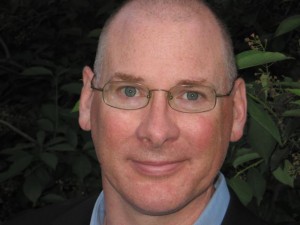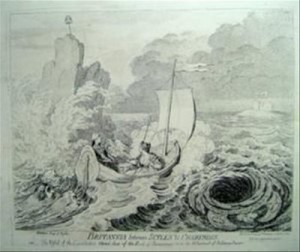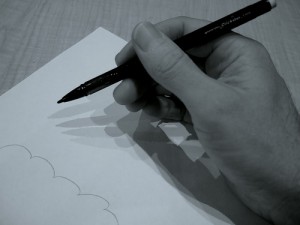 Quotes and Notes is a monthly craft essay series by Steven Wingate. Steven teaches at the University of Colorado. His short story collection Wifeshopping won the 2007 Bakeless Prize in fiction from the Bread Loaf Writers’ Conference and was published by Houghton Mifflin in 2008.
Quotes and Notes is a monthly craft essay series by Steven Wingate. Steven teaches at the University of Colorado. His short story collection Wifeshopping won the 2007 Bakeless Prize in fiction from the Bread Loaf Writers’ Conference and was published by Houghton Mifflin in 2008.
“Every now and then go away, have a little relaxation, for when you come back to your work your judgment will be surer. Go some distance away because then the work appears smaller, and more of it can be taken in at a glance, and a lack of harmony and proportion is more readily seen.” — Leonardo da Vinci

Write every day. If you’ve had any formal training in fiction, or even informal training, you’ve probably heard those three words a thousand times. If you have had the chance to teach fiction, then you’ve probably mouthed them too. Having a disciplined daily practice is such an entrenched idea within the craft that it seems almost unquestionable. Do we write every day? Of course we do! We’re fiction writers! But hanging onto daily practice merely out of obligation or guilt can do more harm than good, especially when it leads us into cycles of endless revision. We need to know when to stop spinning our wheels and step away to take vacations from our projects. Granting ourselves permission to break the Write every day rule with a sense of purpose (and without guilt) is a crucial project management tool, though it often gets used only when we’re exhausted, bored with our own work, at dead ends, or questioning our desire to keep writing at all.
All of these are perfectly good reasons to take vacations from writing, but it’s also nice to not have to fling ourselves against the wall until we’re bloody before we allow ourselves a break. Some writers instinctually listen to the voice that says Put it away and move on to side projects, and some impose non-writing vacations on themselves—after a book comes out, for instance. Put it away probably gets said in the teaching of fiction just as much as Write every day, and probably by the same people. But it seems to me that most of the writers I know who handle their put-away time productively are over fifty, quite established professionally, and well-aware of their personal rhythms. They have seen enough projects get conceived, aborted, re-conceived, and born to manage the flow of their energy.

Put it Away v. Write Every Day, aka Scylla and Charybdis
Writers who aren’t established (for the record, I include myself in this category) can get caught in the crossfire between the Scylla-and-Charybdis mantras of Put it away and Write every day. Plenty of new and emerging writers who have managed to create a disciplined daily practice have a hard time letting go of it, and without the success of plentiful publications to rest upon, we can develop a counter-productive kind of tenacity. Like athletes who play with injuries, we can “gut it out” on a project in hopes of bringing our work (and our careers) to new and higher levels, but end up serving neither our work nor our careers. We’re more likely than writers who are established to take time off from our work because we have to (burn-out, exhaustion) than because we want to (stepping back and refreshing ourselves).
Some writers can take huge swaths of time off from their practice, but I’ve always been a terrible wretch when I go for more than a few days without writing—I need to be either on the beach or lost in some megalopolis in order to keep myself away from the keyboard and pen. Writers of that ilk usually have side projects—such as this very column—to keep up the appearance and feeling of quotidian discipline while stepping away from our main projects, and it seems a win-win situation all around. We get to immerse ourselves in the writing headspace and put words on the page, as well as get things done and off of our desks; yet at the same time, we feel we’re being good to our front-burner projects by taking a step back from them in the way that da Vinci suggests. It feels especially good when those side projects aren’t fiction—poems, essays, screenplays, etc. can all effectively satisfy the part of ourselves that has internalized the Write every day mantra. Because I’m writing this column, I can get that mantra/monkey off my back and not imagine the scowling faces of every fiction teacher and mentor who ever told me those three little words. And at the same time, I’m able to put away my novel for a month (though my wife predicts I’ll only last two weeks) and therefore enable myself see more clearly all its shortcomings of harmony and proportion, which I am sure are legion.

photo by lowjumpingfrog
But in truth, side projects can become panaceas and band-aids. I’m not suggesting that they can’t be intrinsically valuable or instrumentally useful to the fiction writer, but they can too easily be used to mask the deeper questions about our relationships with our front-burner projects. By using side projects to resolve our feelings about the push/pull between Write every day and Put it away, we may be avoiding the real crux of the issue: not productivity or daily persistence, but the trust we place in ourselves as writers and the development of our authorial decisiveness.
Let’s look at the da Vinci quote. The “stepping away” that he calls for is not presented as a kind of vacation—though no doubt the two ideas can align themselves quite delightfully. He doesn’t say “Go away and recharge your batteries because you’ll come back a nicer person.” His emphasis is on going away “because when you come back to the work your judgment will be surer.” The going away is seen in the context of the creation of the work, and therefore needs to be considered as a phase of the work rather than as an act of temporary abandonment for the sake of our own sanity. We may take vacations to refresh ourselves and become nicer, but we subject a work to the phase called Put it away in order to better it.
What happens during that put-away time? Obviously nothing changes with the text itself, so the changes all occurs within us as authors. The da Vinci quote suggests that three things are happening: our judgment gets surer, we see the big picture better, and we notice what doesn’t work. Good vision and judgment are nice things to have, no doubt, but they are meaningless if they don’t change our approach when we go back to work. One thing that separates real masters of the fiction craft from the much larger pool of people who are very good writers is the increase in decisiveness that comes with put-away time. The people who have been at the craft for a long time (and who successfully push themselves forward in it) find ways to develop their own decision-making muscles so that, when they go back to a work of fiction, they are then able to execute their new vision more clearly. They take good advantage of the time they have taken off from the project and go back into it prepared to make whatever changes are necessary for the good of the work.
I believe that this is not some extra-special talent, but a skill that can and must be learned. It’s not simply confidence, either—Kafka wasn’t particularly confident about his own fictions, but he still executed them decisively on the page. It’s more a level of trust that the work is going to be what it’s supposed to be, combined with a commitment to follow through on the decisions that we make as we write. Fiction rarely takes us where we think it will. But if we follow our decisions, they will at least lead us to a phase of temporary completion—at which point we can go away, have a little relaxation, and come back with surer judgment, repeating the process until the work is done.

photo by Per Ola Wiberg (Powl)
If we don’t reach achieve that decisiveness, the work is never done—and there’s something tempting about that. It’s too easy, especially for writers who don’t have completed and published works to rest upon, to rely on the potentials within a work instead of giving it definite shape. For these writers, revision easily becomes endless tinkering. But we’re capable of learning decisiveness, just as we’re capable of learning the rhythms of stepping away from a work and stepping back into it. Creating distance between ourselves and our work is great, but knowing what to do with that distance and how to use the rhythms of the project to its own best advantage is even better. Understanding those rhythms goes hand in hand with the development of authorial trust and decisiveness.
So while I’d like to say that we should all just stop writing and go somewhere to relax, refresh ourselves, and cultivate our interior gardens, stepping away from one’s work is a more complicated matter for a committed fiction writer with a well-established daily practice. Something happens to us during the put-away phase, and it’s neither magical nor serendipitous. Whether we fill that time with side projects or do nothing at all, we still must come to some new terms with the work in question and approach it with an increased sense of decisiveness when we get back to it. The goal of the time and the writerly vacation is not simply seeing our work in a new light, but achieving—or allowing it, as the case may be—the self-trust that brings our work to completion.
Further Resources

Hemingway's former home in Key West, photo by Shannon McKenna Schmidt
– Read more of Leonardo da Vinci’s writings in The da Vinci Notebooks, available from your local independent bookseller.
– A wide variety of famous writers’ regimens are showcased at the Daily Routines blog.
– Robert Benchley offers tips on how to avoid writing altogether.
– Larger philosophical questions aside, if you decide to take a real vacation, try one with a literary flavor. This short article tours five famous writers’ homes, and this Novel Destinations blog provides highlights from the book of the same name (by Shannon McKenna Schmidt and Joni Rendon).
– And here is some vacation advice for freelance writers — creative or not. Put the guilt away.





